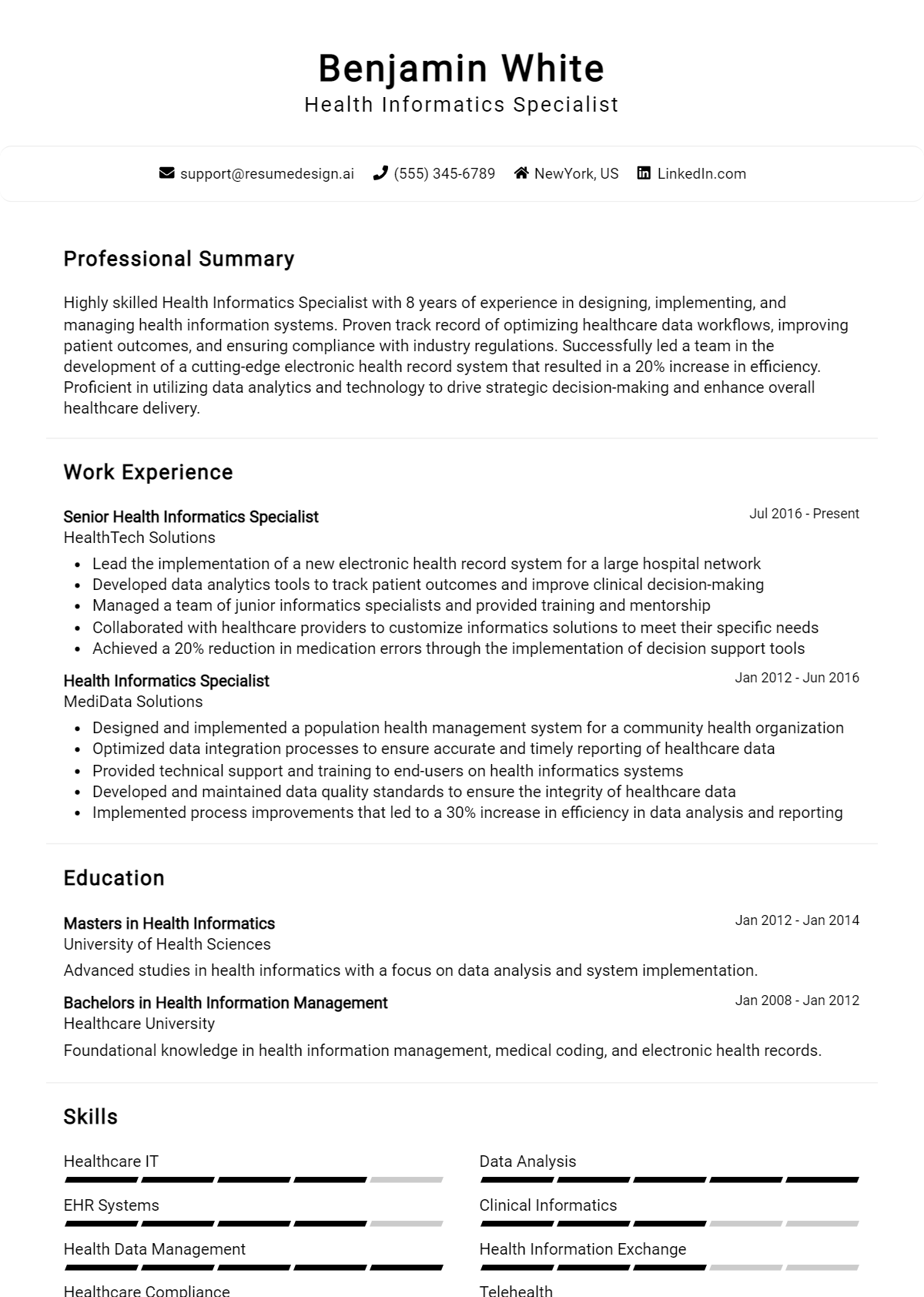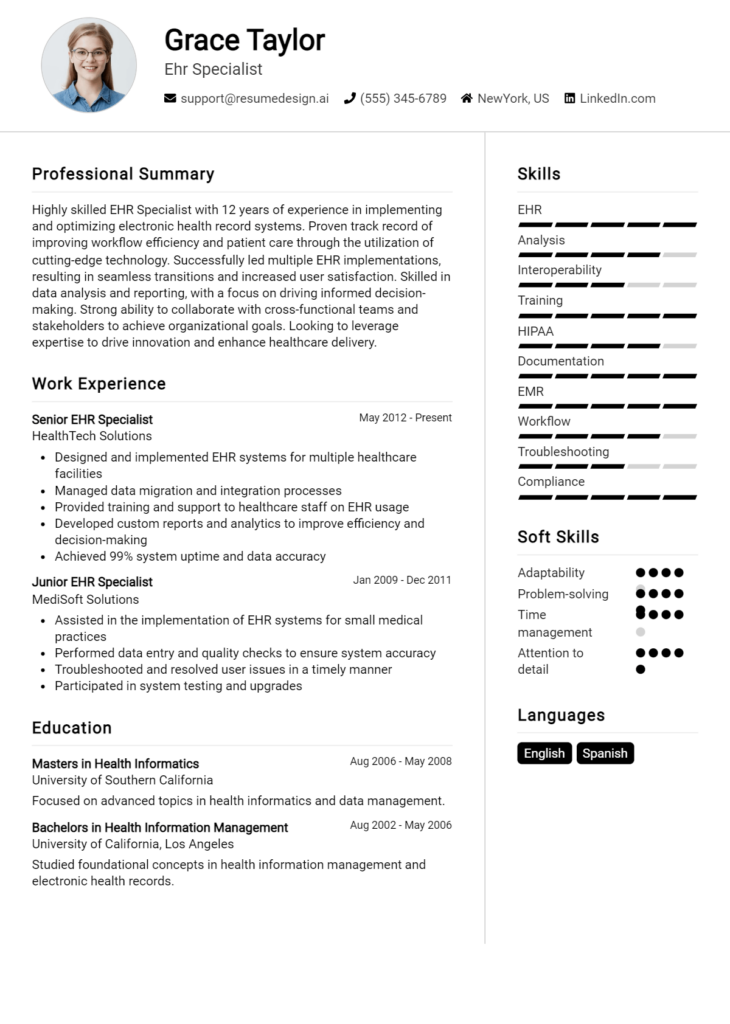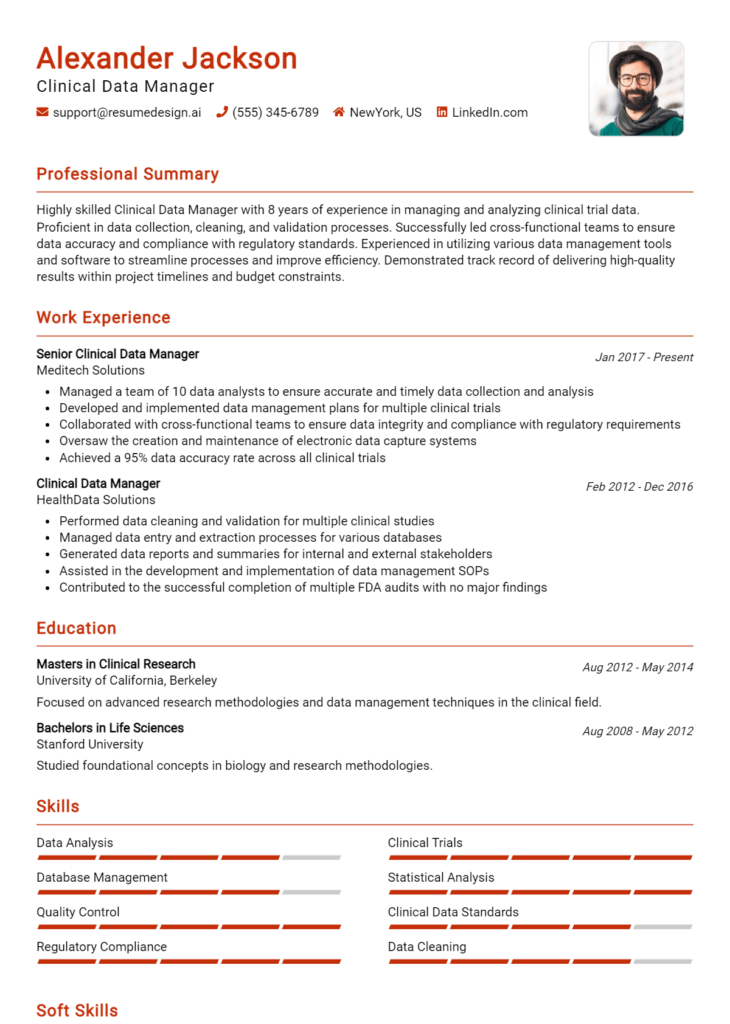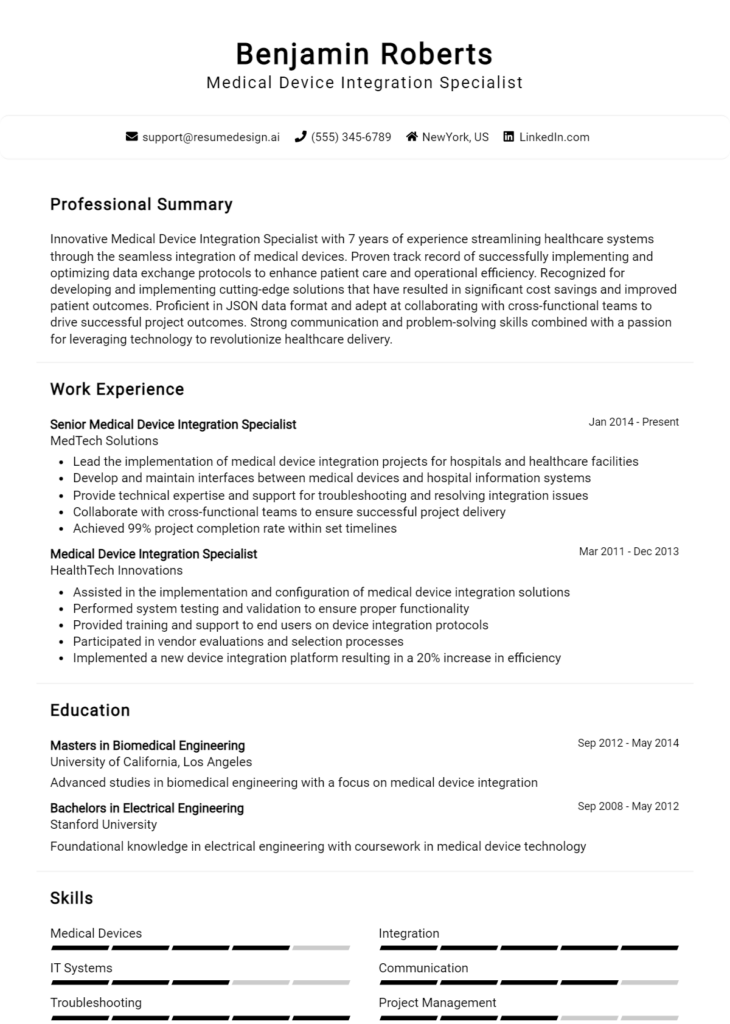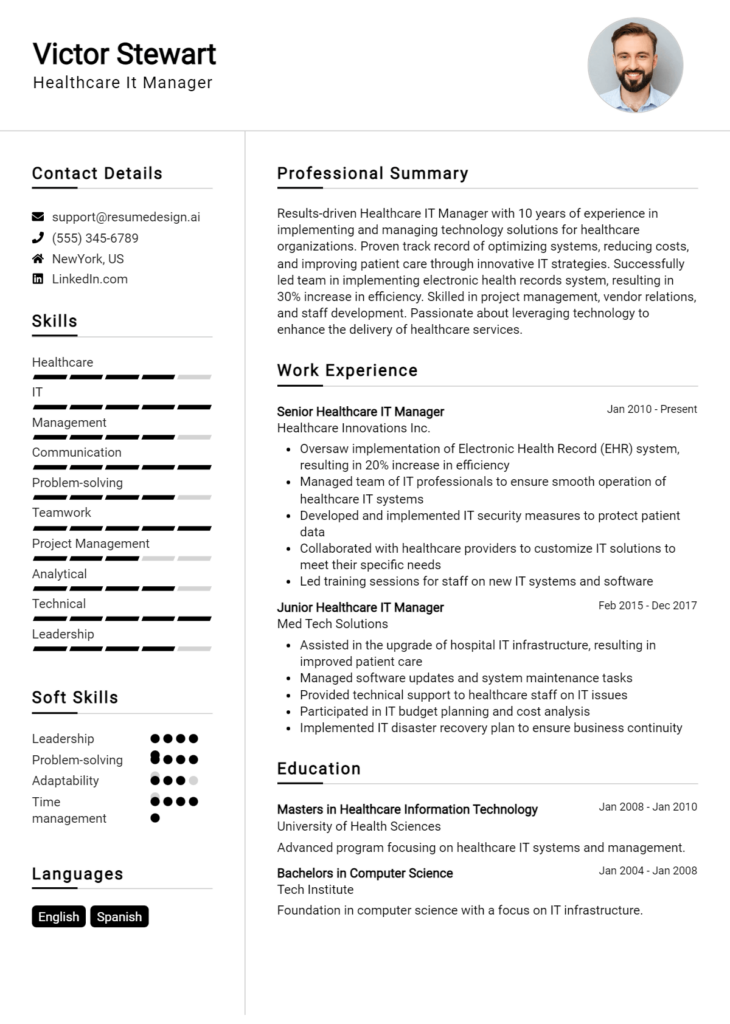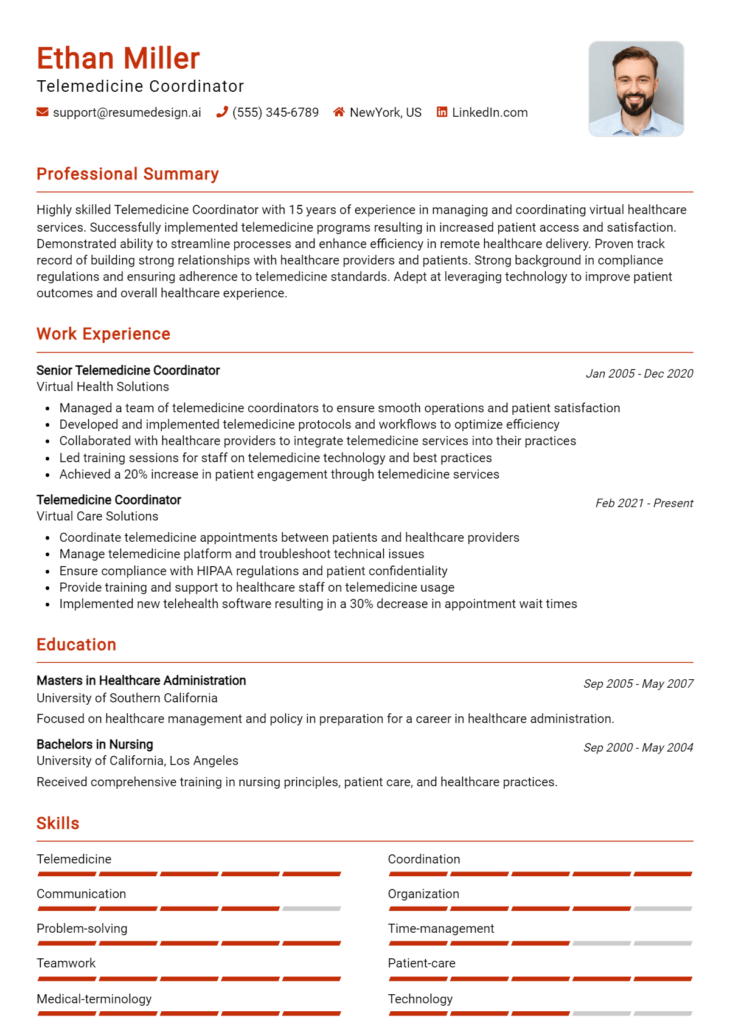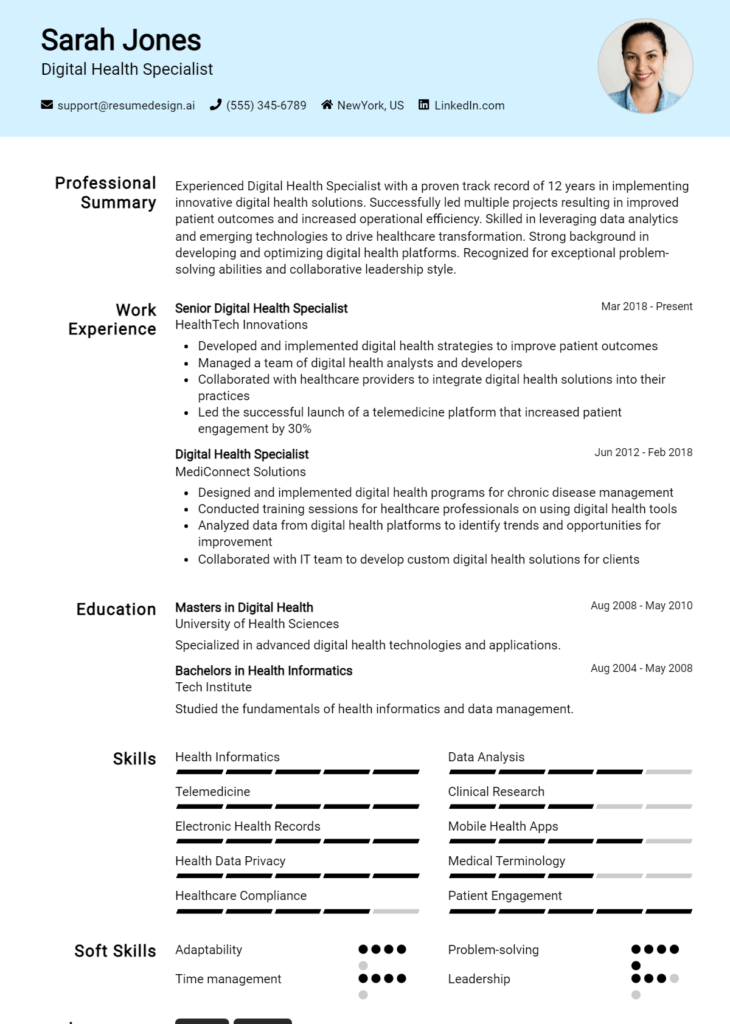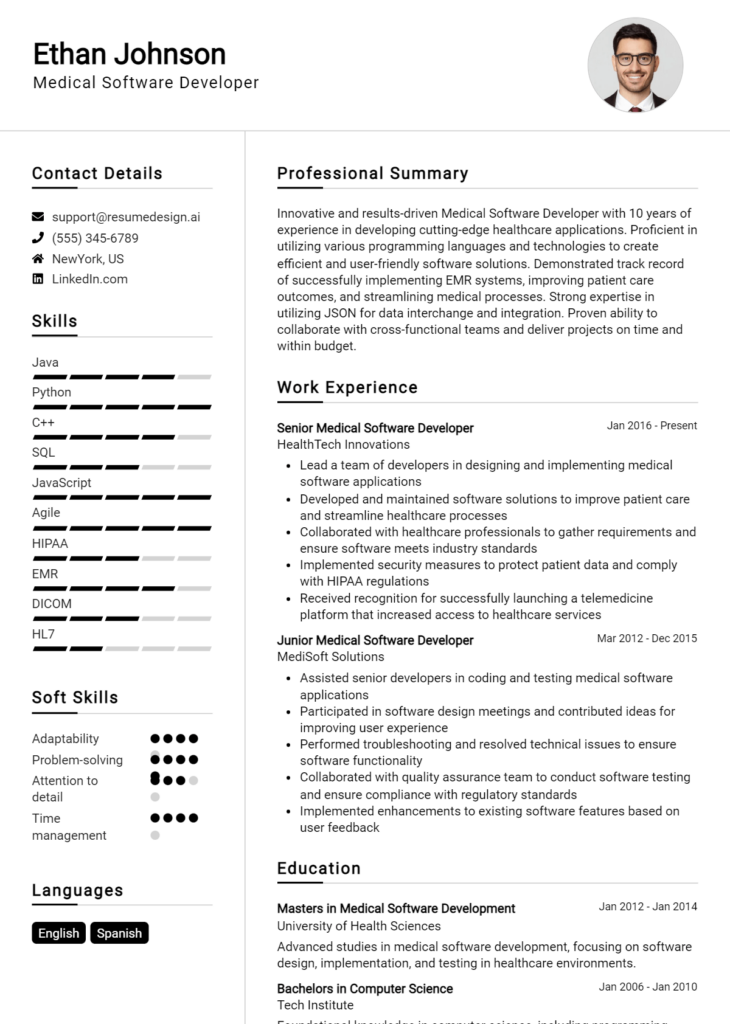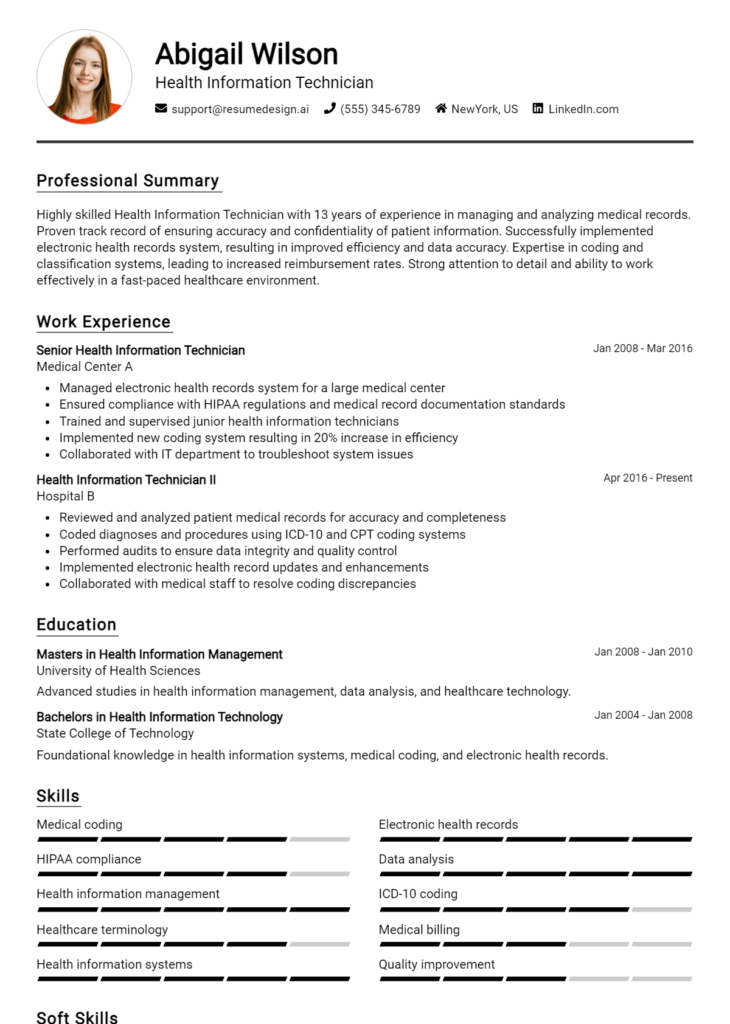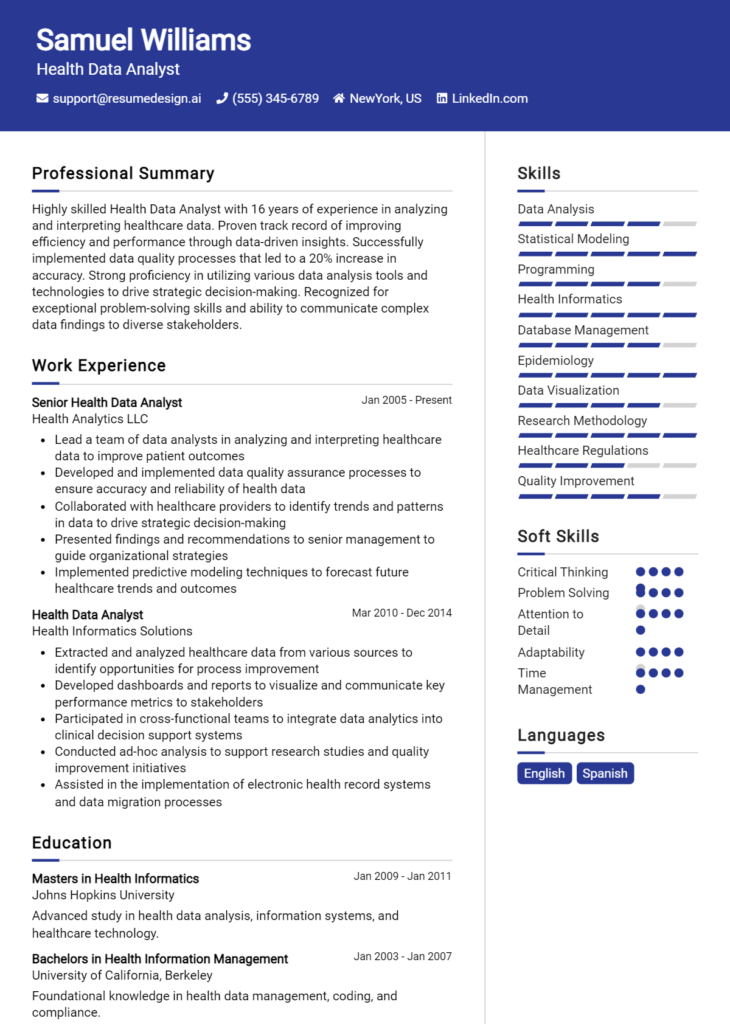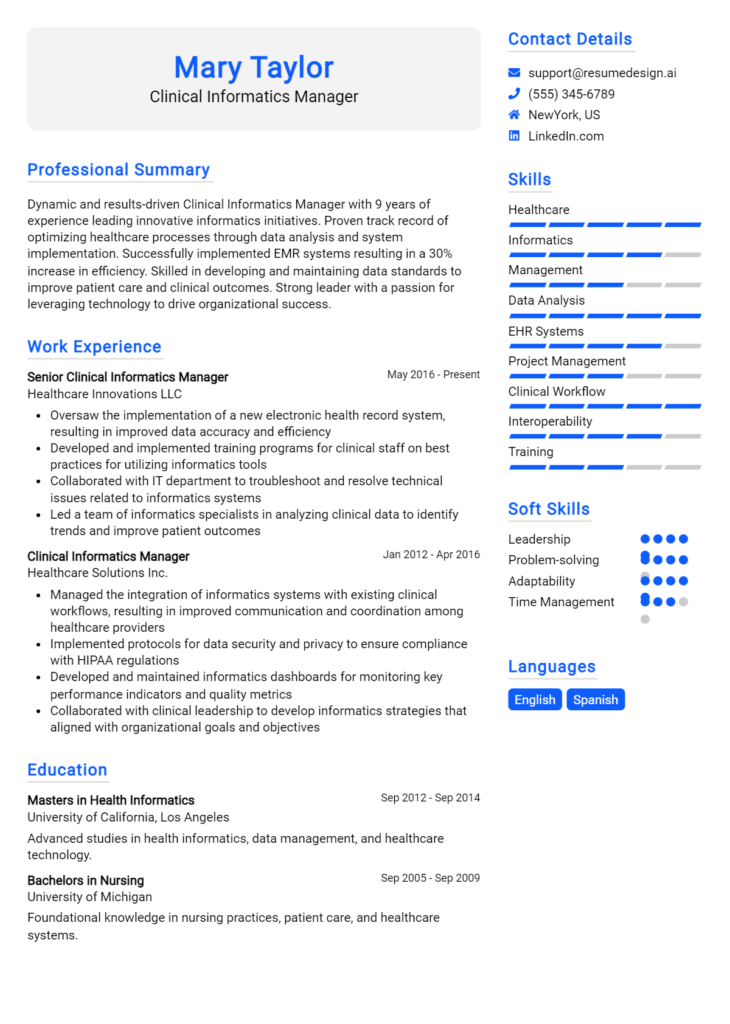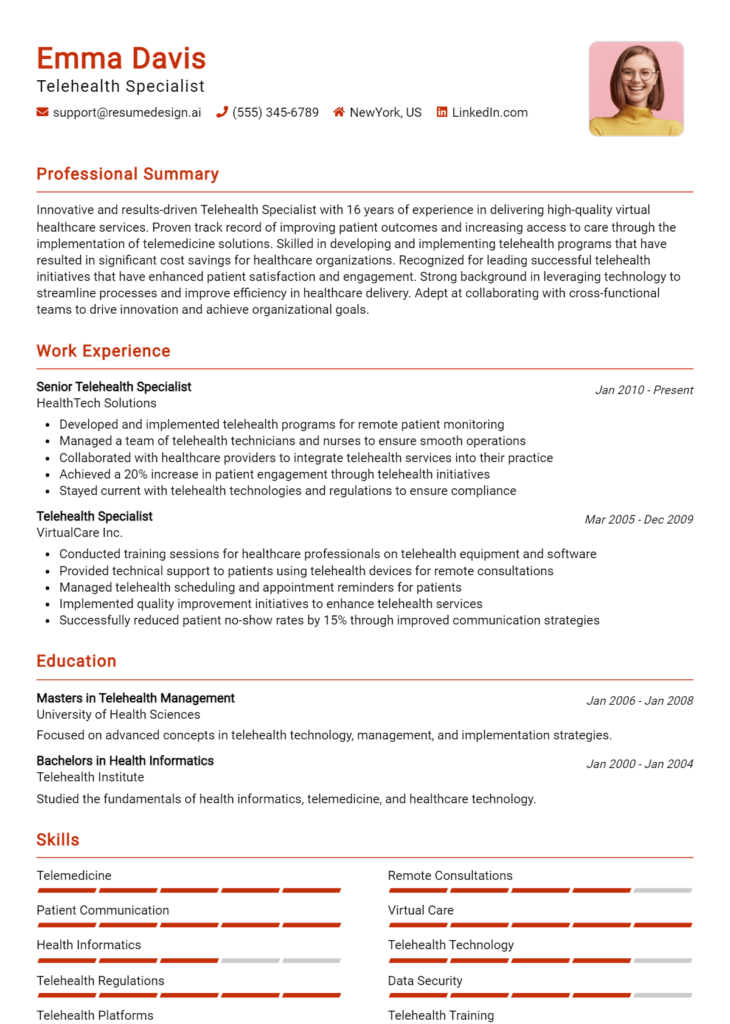Health Informatics Specialist Core Responsibilities
A Health Informatics Specialist plays a crucial role in bridging clinical and administrative departments by managing health information systems and ensuring data integrity. Key responsibilities include implementing electronic health records (EHR), analyzing health data for quality improvement, and facilitating communication between IT and healthcare teams. Essential skills include technical proficiency, operational knowledge, and strong problem-solving abilities, which contribute to enhanced patient care and organizational efficiency. A well-structured resume can effectively highlight these qualifications, demonstrating the candidate’s value to potential employers.
Common Responsibilities Listed on Health Informatics Specialist Resume
- Implement and maintain electronic health record (EHR) systems.
- Analyze health data to identify trends and improve patient outcomes.
- Collaborate with clinical and IT teams to enhance information flow.
- Ensure compliance with healthcare regulations and standards.
- Train staff on health informatics tools and protocols.
- Conduct assessments of current information systems to identify areas for improvement.
- Support the integration of new technologies into health workflows.
- Develop and maintain documentation related to health informatics processes.
- Monitor data quality and implement data governance policies.
- Facilitate interdisciplinary meetings to discuss health informatics initiatives.
- Assist in the preparation of reports for stakeholders and regulatory bodies.
- Stay updated on emerging trends and best practices in health informatics.
High-Level Resume Tips for Health Informatics Specialist Professionals
In the competitive field of health informatics, a well-crafted resume serves as a crucial gateway to landing your dream job. Often the first impression a potential employer has of a candidate, your resume must effectively encapsulate your skills, experiences, and achievements. It is not merely a list of job titles or educational qualifications; rather, it is an opportunity to tell your professional story in a way that resonates with hiring managers. A strong resume tailored for health informatics will not only highlight your technical expertise but also showcase your ability to contribute significantly to healthcare organizations. This guide will provide practical and actionable resume tips specifically designed for Health Informatics Specialist professionals, ensuring that your resume stands out in the crowded job market.
Top Resume Tips for Health Informatics Specialist Professionals
- Tailor your resume to the job description by using keywords and phrases from the posting to align your skills with the employer's needs.
- Showcase relevant experience by emphasizing roles that highlight your expertise in health informatics, including specific technologies and methodologies you've used.
- Quantify your achievements with metrics, such as improvements in patient outcomes or efficiencies gained through data management initiatives.
- Highlight industry-specific skills such as data analysis, electronic health record (EHR) systems proficiency, and health information exchange (HIE) knowledge.
- Include certifications relevant to health informatics, such as Certified Health Informatics Systems Professional (CHISP) or Certified Professional in Health Informatics (CPHI).
- Utilize a clean, professional format that enhances readability, ensuring that the most important information stands out.
- Incorporate a summary statement at the top of your resume that captures your career goals and key qualifications in health informatics.
- Keep your resume concise, ideally one page, while ensuring it reflects your depth of expertise and experience.
- List relevant continuing education or training programs to show commitment to professional development in the rapidly evolving health informatics field.
By implementing these tips, you can significantly enhance your resume's effectiveness and increase your chances of landing a job in the Health Informatics Specialist field. A well-structured and tailored resume not only communicates your qualifications but also demonstrates your dedication to advancing healthcare through technology and data management, making you a desirable candidate for potential employers.
Why Resume Headlines & Titles are Important for Health Informatics Specialist
In the competitive field of health informatics, a well-crafted resume headline or title can be the difference between landing an interview and being overlooked. For a Health Informatics Specialist, the headline serves as a crucial first impression, encapsulating the candidate's core qualifications and expertise in a concise yet impactful manner. A strong headline grabs the attention of hiring managers immediately, summarizing essential skills and experiences in just a few words, making it easier for recruiters to identify top talent quickly. Therefore, it is vital that the headline is relevant to the specific job being applied for, ensuring it resonates with both the role's requirements and the employer's needs.
Best Practices for Crafting Resume Headlines for Health Informatics Specialist
- Keep it concise: Aim for one to two impactful phrases.
- Be role-specific: Use industry-related keywords relevant to health informatics.
- Highlight key strengths: Focus on your most significant skills and accomplishments.
- Use action-oriented language: Start with strong verbs to convey confidence.
- Tailor to the job: Adapt your headline for each application to reflect the job description.
- Avoid jargon: Use clear language that can be understood by a wide audience.
- Use numbers when possible: Quantify achievements to provide context and impact.
- Stay professional: Maintain a formal tone befitting the healthcare industry.
Example Resume Headlines for Health Informatics Specialist
Strong Resume Headlines
"Data-Driven Health Informatics Specialist with 5+ Years of Experience in EHR Implementation"
“Certified Health Informatics Professional Specializing in Data Analytics and Patient Safety”
“Innovative Health Informatics Specialist Focused on Improving Patient Outcomes through Technology”
Weak Resume Headlines
“Health Informatics Specialist”
“Looking for a Job in Health Informatics”
The strong headlines are effective because they immediately convey specific skills, experiences, and value, setting the candidate apart from others. They utilize industry-relevant keywords and highlight achievements, which resonate with hiring managers looking for qualified applicants. In contrast, the weak headlines fail to impress because they are too generic and lack any indication of the candidate's qualifications or unique strengths. This vagueness does not entice hiring managers to delve deeper into the resume, ultimately resulting in missed opportunities.
Writing an Exceptional Health Informatics Specialist Resume Summary
A well-crafted resume summary is essential for a Health Informatics Specialist as it serves as a powerful introduction that grabs the attention of hiring managers. This brief section of the resume highlights key skills, relevant experience, and notable accomplishments, providing a snapshot of the candidate's qualifications. A strong summary should be concise yet impactful, tailored specifically to the job being applied for, ensuring that it resonates with the employer's needs and expectations. By effectively showcasing expertise in health informatics, data management, and patient care systems, candidates can position themselves as ideal contenders for the role.
Best Practices for Writing a Health Informatics Specialist Resume Summary
- Quantify achievements: Use numbers to highlight the impact of your contributions, such as improved patient outcomes or reduced costs.
- Focus on relevant skills: Emphasize technical skills and knowledge pertinent to health informatics, such as EHR systems, data analysis, and healthcare regulations.
- Tailor the summary: Customize the summary for each job application to align with the specific requirements and keywords in the job description.
- Keep it concise: Aim for 3-5 sentences that deliver a clear, powerful message about your qualifications.
- Use action verbs: Start sentences with dynamic verbs to convey proactivity and effectiveness.
- Showcase certifications: Include relevant certifications or degrees that enhance credibility in the health informatics field.
- Highlight collaboration: Mention experience working with healthcare teams or stakeholders to show your ability to thrive in a collaborative environment.
- Maintain professionalism: Use formal language and avoid jargon to ensure clarity and professionalism.
Example Health Informatics Specialist Resume Summaries
Strong Resume Summaries
Dynamic Health Informatics Specialist with over 5 years of experience in optimizing electronic health record (EHR) systems, resulting in a 30% increase in data accuracy and a 25% reduction in documentation errors. Proficient in data analysis and healthcare analytics, with a proven track record of enhancing patient care through innovative technology solutions.
Results-driven Health Informatics professional skilled in implementing and managing health information systems. Successfully led a project that improved patient data retrieval times by 40%, enhancing overall clinical workflow efficiency. Holds a Master’s degree in Health Informatics and is certified in Epic and Cerner systems.
Accomplished Health Informatics Specialist with expertise in clinical data management and interoperability standards. Spearheaded a cross-departmental initiative that decreased patient wait times by 20% through streamlined information exchange, fostering improved patient satisfaction and care delivery.
Weak Resume Summaries
Health Informatics Specialist with experience in healthcare systems and a background in technology. I am looking for a position where I can use my skills.
I have worked in health informatics and have knowledge of EHR systems. I am motivated and ready to contribute to a team.
The strong resume summaries are effective because they quantify achievements, highlight specific skills, and are directly relevant to the Health Informatics Specialist role, showcasing the candidate's impact in previous positions. In contrast, the weak summaries lack detail, fail to demonstrate measurable outcomes, and come across as generic, making it difficult for hiring managers to assess the candidates' qualifications or unique value. By providing concrete examples and focusing on relevant experiences, candidates can significantly enhance their chances of standing out in a competitive job market.
Work Experience Section for Health Informatics Specialist Resume
The work experience section of a Health Informatics Specialist resume is critical in demonstrating the candidate's relevant expertise and capabilities within the field. This section serves as a platform to showcase technical skills, the ability to manage teams effectively, and a commitment to delivering high-quality products that meet industry standards. By quantifying achievements—such as improvements in patient data management or reductions in operational costs—candidates can further highlight their impact on organizational success. Aligning work experiences with industry benchmarks also underscores the candidate's understanding of the health informatics landscape, making them a more attractive prospect for potential employers.
Best Practices for Health Informatics Specialist Work Experience
- Highlight specific technical skills relevant to health informatics, such as EHR systems, data analytics, and interoperability standards.
- Quantify achievements using metrics, such as percentage improvements, cost savings, or the number of projects completed on time.
- Demonstrate leadership capabilities through examples of team management or project oversight.
- Include collaborative efforts with multidisciplinary teams to show your ability to work cohesively in a healthcare environment.
- Tailor your experience descriptions to align with industry standards and specific job requirements.
- Use active language and strong verbs to convey a sense of proactivity and results-oriented performance.
- Incorporate relevant certifications or training that enhance your credentials in health informatics.
- Focus on outcomes and improvements that resulted from your actions, rather than just listing duties.
Example Work Experiences for Health Informatics Specialist
Strong Experiences
- Led a team that implemented a new EHR system across three facilities, resulting in a 30% increase in data retrieval efficiency and a 15% reduction in patient wait times.
- Developed a data analytics tool that identified patient care trends, which helped reduce hospital readmission rates by 20% over two years.
- Collaborated with IT and clinical staff to streamline data sharing protocols, achieving a 40% improvement in interdepartmental communication and data accuracy.
- Managed a cross-functional team to complete a telehealth project that increased patient engagement by 25% and improved access to care in underserved areas.
Weak Experiences
- Worked on a project related to health data management.
- Assisted in the implementation of a new software system.
- Participated in team meetings and discussions about improving patient care.
- Helped with data entry tasks as part of a larger project.
The examples presented above illustrate the stark contrast between strong and weak experiences. Strong experiences are characterized by specific achievements, quantifiable outcomes, and a clear demonstration of leadership and collaboration, showcasing the candidate's value. In contrast, weak experiences are vague, lack measurable impact, and do not effectively convey the candidate's skills or contributions, making them less compelling to prospective employers.
Education and Certifications Section for Health Informatics Specialist Resume
The education and certifications section of a Health Informatics Specialist resume is vital as it serves as a testament to the candidate's academic foundation and professional qualifications in a rapidly evolving field. This section not only showcases the candidate's formal education but also underscores their commitment to continuous learning through industry-relevant certifications and specialized training. By providing details on relevant coursework and notable credentials, candidates can significantly enhance their credibility and demonstrate their alignment with the specific requirements of the job role, ultimately making a compelling case for their suitability for the position.
Best Practices for Health Informatics Specialist Education and Certifications
- Include degrees related to health informatics, health information management, or computer science.
- List certifications from recognized organizations such as AHIMA or HIMSS that are relevant to health informatics.
- Detail relevant coursework that demonstrates specialized knowledge in data analysis, health data standards, or electronic health records.
- Highlight any advanced degrees, such as a Master’s in Health Informatics or related fields.
- Utilize specific terminology and keywords related to the health informatics industry.
- Provide dates of completion for certifications to show currency in the field.
- Include any ongoing education, such as workshops or online courses, to indicate a commitment to professional development.
- Be concise but thorough in descriptions, ensuring clarity without overwhelming the reader.
Example Education and Certifications for Health Informatics Specialist
Strong Examples
- M.S. in Health Informatics, University of Example, 2021
- Certified Health Data Analyst (CHDA), AHIMA, 2023
- Relevant Coursework: Health Information Systems, Data Management in Healthcare, and Clinical Decision Support Systems
- Certified Health Informatics Systems Professional (CHISP), HIMSS, 2022
Weak Examples
- B.A. in English Literature, University of Example, 2010
- Certification in Basic Computer Skills, 2015
- Relevant Coursework: Intro to Psychology, History of Medicine
- Certification in Microsoft Office Suite, 2016
The strong examples listed above are considered effective because they directly relate to the qualifications and skills necessary for a Health Informatics Specialist, showcasing relevant degrees, recognized certifications, and pertinent coursework. In contrast, the weak examples fail to demonstrate relevance to the field, featuring degrees and certifications that do not align with health informatics or that are outdated, thus diminishing the candidate's credibility and appeal for the role.
Top Skills & Keywords for Health Informatics Specialist Resume
The role of a Health Informatics Specialist is pivotal in bridging the gap between healthcare and technology. As the industry continues to evolve, showcasing the right skills on a resume becomes crucial for standing out in a competitive job market. Employers look for candidates who not only possess technical expertise but also demonstrate strong interpersonal and analytical skills. A well-crafted resume that highlights both hard and soft skills can significantly enhance a candidate's chances of securing an interview and ultimately, the job. For those interested in honing their skills in health informatics, understanding the key competencies required for this role is essential.
Top Hard & Soft Skills for Health Informatics Specialist
Soft Skills
- Effective communication
- Problem-solving abilities
- Team collaboration
- Critical thinking
- Adaptability
- Attention to detail
- Empathy and patient-centered focus
- Leadership capabilities
- Time management
- Conflict resolution
Hard Skills
- Electronic Health Records (EHR) management
- Data analysis and interpretation
- Health information exchange (HIE) knowledge
- Familiarity with healthcare regulations (HIPAA, etc.)
- Medical coding and billing
- Database management
- Programming languages (e.g., SQL, Python)
- Health IT project management
- Interoperability standards (HL7, FHIR)
- Data visualization tools (e.g., Tableau, Power BI)
- Cybersecurity principles in healthcare
- Clinical workflows understanding
- Workflow automation tools
- Analytical software (e.g., SAS, SPSS)
- Research methodologies in health informatics
- Data quality improvement techniques
- User training and support in health IT systems
By emphasizing both soft and hard skills on your resume, you can effectively illustrate your readiness for the challenges of a Health Informatics Specialist role, complementing your work experience with the necessary competencies to thrive in this dynamic field.
Stand Out with a Winning Health Informatics Specialist Cover Letter
Dear [Hiring Manager's Name],
I am writing to express my interest in the Health Informatics Specialist position at [Company Name], as advertised on [where you found the job listing]. With a strong background in health information technology and a passion for improving patient care through data analytics, I am excited about the opportunity to contribute to your team and help drive innovative solutions in healthcare.
In my previous role at [Your Previous Company], I successfully implemented an electronic health record (EHR) system that enhanced data accuracy and workflow efficiency, ultimately improving patient outcomes. My experience in analyzing complex health data and translating it into actionable insights has equipped me with the skills necessary to support clinical decision-making and optimize health information systems. I am particularly skilled in leveraging tools such as SQL and Python to assess data integrity and facilitate quality improvement initiatives.
Moreover, my collaborative spirit and effective communication skills have allowed me to work closely with both clinical staff and IT teams, ensuring that technology solutions align with the needs of healthcare providers and patients alike. I am committed to staying abreast of industry trends and regulatory changes to ensure compliance and enhance the overall effectiveness of health informatics initiatives. I am eager to bring my expertise in data management and system optimization to [Company Name], contributing to your mission of delivering high-quality, patient-centered care.
Thank you for considering my application. I am looking forward to the opportunity to discuss how my background, skills, and enthusiasms align with the goals of your team. I am excited about the possibility of contributing to [Company Name] and am eager to provide impactful health informatics solutions that improve patient care.
Sincerely,
[Your Name]
[Your Contact Information]
Common Mistakes to Avoid in a Health Informatics Specialist Resume
When crafting a resume for a Health Informatics Specialist position, it's essential to present your qualifications, skills, and experiences effectively. However, many candidates make common mistakes that can hinder their chances of landing an interview. Understanding these pitfalls can help you create a compelling resume that stands out to employers in the healthcare sector.
Lack of Specificity: Failing to provide specific examples of your work in health informatics can make your resume vague. Use quantifiable achievements to demonstrate your impact.
Ignoring Relevant Skills: Health informatics requires a blend of technical and healthcare knowledge. Not highlighting relevant skills such as data analytics, health information technology, or electronic health records (EHR) management can weaken your application.
Overloading with Jargon: While industry-specific terminology may be important, overloading your resume with jargon can alienate hiring managers. Aim for clarity and ensure your accomplishments are easily understood.
Poor Formatting: A cluttered or overly complex format can detract from your resume's readability. Use clear headings, bullet points, and consistent font styles to improve organization.
Neglecting Continuing Education: The field of health informatics is constantly evolving. Failing to mention certifications, training, or workshops can signal a lack of commitment to professional growth.
Listing Job Duties Instead of Achievements: Many candidates simply list their job responsibilities rather than focusing on what they accomplished in those roles. Highlighting achievements can showcase your contributions more effectively.
Not Tailoring the Resume: A generic resume can undermine your application. Tailor your resume for each job by reflecting the specific qualifications and skills mentioned in the job description.
Ignoring Soft Skills: While technical skills are crucial, neglecting to mention essential soft skills like communication, teamwork, and problem-solving can present an incomplete picture of your capabilities.
Conclusion
As we’ve explored in this article, the role of a Health Informatics Specialist is pivotal in bridging healthcare and technology. With responsibilities ranging from analyzing health data to implementing electronic health records, this position requires a unique blend of technical expertise and healthcare knowledge. Key skills include proficiency in data management systems, understanding of healthcare regulations, and the ability to communicate effectively with both clinical and IT teams.
In today's competitive job market, having a well-crafted resume is essential for standing out as a Health Informatics Specialist. Ensure that your resume highlights relevant experiences, technical skills, and certifications that align with the demands of the role.
Now is the perfect time to review and enhance your resume. Utilize tools such as resume templates to get started, or try our intuitive resume builder to create a professional document tailored to your career aspirations. Additionally, explore resume examples to gain inspiration and see what successful candidates have included in their applications. Don’t forget to complement your resume with a compelling cover letter template that showcases your passion for health informatics.
Take action today and ensure your resume reflects the skills and experiences that make you an exceptional candidate in the field of health informatics!

